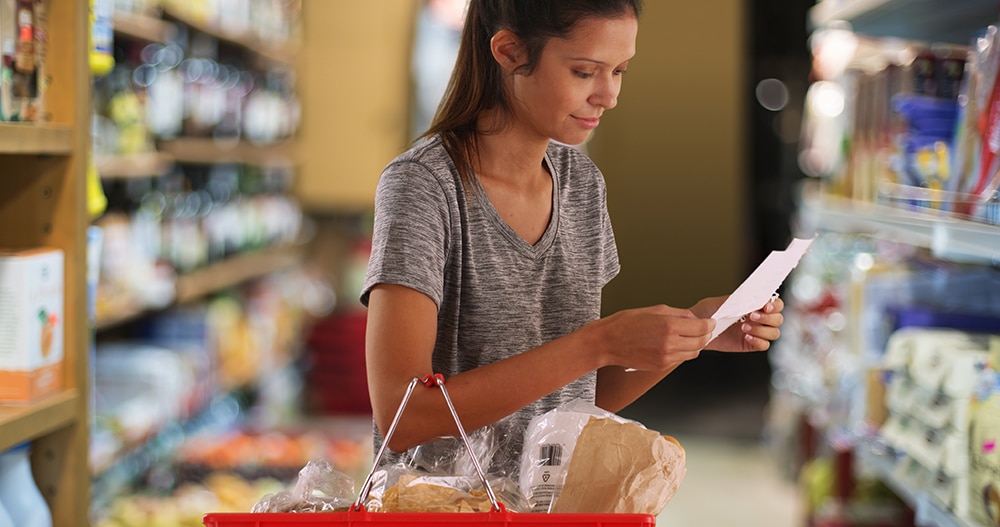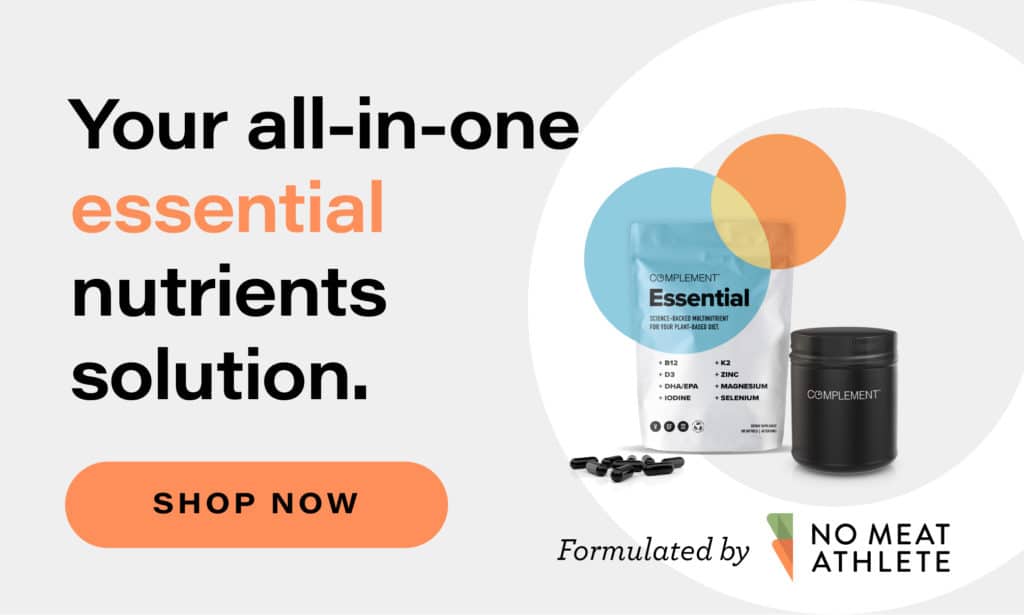
A Vegan Grocery List for Athletes
Grocery shopping is one of those tasks you either view as a chore or a welcomed escape from the house.
But shopping for groceries on a plant-based diet can also be an opportunity to explore new foods and inspire creative dishes.
I actually love grocery shopping, and pre-pandemic, I would often go multiple times per week just to get the freshest ingredients for a recipe I was cooking that night. Was it a good use of time? Maybe not. But it brought me joy.
Still, I probably wouldn’t recommend that type of grocery shopping, especially if you’re just beginning to think about going vegan. Wandering the aisles for a few items can be both frustrating and lead to poor food choices.
Instead, I recommend going in with a list and a plan.
Below are two approaches to grocery shopping and a list of basic pantry staples to get you started. It’s by no means a complete list of every item you might need, but if you have these items in your pantry or fridge, the cooking options are nearly endless.
2 Unique Approaches to Grocery Shopping
In a recent conversation on No Meat Athlete Radio, we realized we have two unique approaches to tackling the grocery store:
- The Engineer: Go into the store with a complete list and stick to it. Don’t get tempted by random foods you see, even if they sound good in the moment.
- The Artist: Shop with a rough list in mind — the essentials you know you’re going to need — then take inspiration from other food items that stand out (sauces, noodles, veggies, etc.).
The first approach requires a bit more planning and often means you’re following specific vegan recipes, but it also means you rarely waste food or get tempted by less-than-healthy items that stand out.
The second reflects a different approach to cooking, one that’s less about recipes and more about using what’s in the fridge or pantry. It follows more of the loose guidelines laid out in our posts like the Sauce System or the Chipotle Method.
Both can work really well depending on your preference when it comes to cooking (recipes vs. loose cooking).
But regardless of how you choose to shop, it really helps to have the basics on hand.
The Vegan Grocery List
Here’s a basic vegan grocery list. With it, I’ve tried to cover all the general foods a plant-based athlete would need.
If you’re new to the plant-based diet, don’t freak out. There’s a lot of green here and maybe a few other ingredients you don’t typically purchase, and that’s totally fine. Maybe leave some of them off for now and try out just a few new items at a time.

(Note: A few items you obviously don’t buy every trip to the store, but they’re good to keep around for cooking.)
- Fruit: Apples, Oranges, Bananas, Pineapples, Fresh Berries, Mixed Frozen Berries (for smoothies), Lemons, Limes, Tomatoes, Avocados, Medjool Dates (for real fruit workout fuel, check out Plant Bites)
- Fresh Vegetables: Romaine Lettuce, Spinach, Broccoli, Kale, Celery, Cucumbers, Bell Peppers, Jalapeno Peppers, Onions, Carrots, Garlic, Basil, Parsley, Cilantro
- Starchy Vegetables: Potatoes, Sweet Potatoes
- Canned or Dried Fruits/Vegetables: Diced Tomatoes, Raisins,
- Legumes: Lentils, Chickpeas, Black Beans (preferably dry, but sometimes canned)
- Non-Wheat Grains: Brown Rice, Quinoa (not technically a grain), Granola, Steel-Cut Oats
- Wheat Products (limited): Whole-Wheat Bread, Pasta, Pitas, Bagels, and Wraps, Low-Sugar Breakfast Cereals
- Nuts and Seeds: Almonds, Cashews, Walnuts, Flaxseeds, Chia Seeds
- Spreads and Pastes: Hummus, Nut Butters (almond is great but expensive), Tahini (sesame seed paste)
- Oils: Olive Oil, Grapeseed Oil, Toasted Sesame Oil, Coconut Oil (solid at room temperature, often in the health food aisle)
- Vinegars: Apple Cider Vinegar, Balsamic Vinegar, Red Wine Vinegar
- Protein powder: If you’re going to get one, be sure it’s low in heavy metals (like Complement Protein)
- Plant Milks: Almond is my favorite
- Tea and Coffee
- Soy Products: Tofu, Tempeh, Tamari or Soy Sauce
- Other Snacks (limited): Tortilla Chips, Salsa, Popcorn
- Plant-Based Meat (optional and limited): Amy’s Frozen Veggie Burgers, Veggie Meat Slices, Beyond Burgers
- Miscellaneous: Maple Syrup, Dark Chocolate, Miyoko’s butter
- A Supplement: Ideally just the essentials.
What about the junk food?
I’ll leave that up to you. There’s no shame in treating yourself to something special, but I don’t think it belongs on an essentials list like this.

With this list, the options are endless…
If you follow the list above, you can categories everything into one of four categories:
- Fruits, veggies, and greens
- Proteins (nuts, seeds, soy products, and legumes)
- Grains
- Miscellaneous (oils, vinegar, etc.)
As an athlete, focused mostly on my carbohydrate-to-protein ratios, those first three categories are pretty much where I live.
And with these basics, you can whip up endless plant-based recipes your whole family will love.
Leave a Reply
Dear Matt,
I am hoping that you tell all not to buy added oils as they are so heart unhealthy! Bad for athletes as you cannot recover as fast. See dr. Caldwell esselstyn!
Oils are processed foods which damage our endothelial cells holding open our arteries and oils wipe out vital nitric oxide. Thank you for checking up on this crucial health info!
Thank you,
Linda Middlesworth
Ps Robert Cheeke knows this too!
Thank you so much! This is so helpful!
Thanks matt. Im confused why the heck i buy so much food for my elderly mother and i. I mainly eat whole foods. Keep shoppin and never seems to end. Im 6’3” and about 230 and mainly muscular with a bit of tummy fat. I want to somehow buy/eat less food but still prepare healthy meals. Meals are mainly a salad with various veg etc and then a main like tofu/veg/rice or buckwheat noodles. Any examples of low cost/healthy meals? I’m thinking of using dried beans vs canned and more frozen veg.
Thanks matt. I buy so much food for my elderly mother and i. We mainly eat whole foods. Im 6’3” and about 230 and mainly muscular with a bit of tummy fat. I want to buy/eat less food but still prepare healthy meals. Each meal is mainly a salad (with various veg etc) and main like tofu/veg/rice or buckwheat noodles. Any examples of low cost/healthy meals? Thinking of using dried beans vs canned and more frozen veg.




Sunflower seeds. I’m learning that their protein and fiber content are better than cashews, and they can be used to make creamy cheesy dishes like cashews. And sunflower seeds are better for the environment and the workers. They require less water for cultivation. Cashew harvesting requires workers to interact with the acid of the cashew husk, and they get burned. I recently bought a sunflower seed cookbook. Some really yummy things in there!